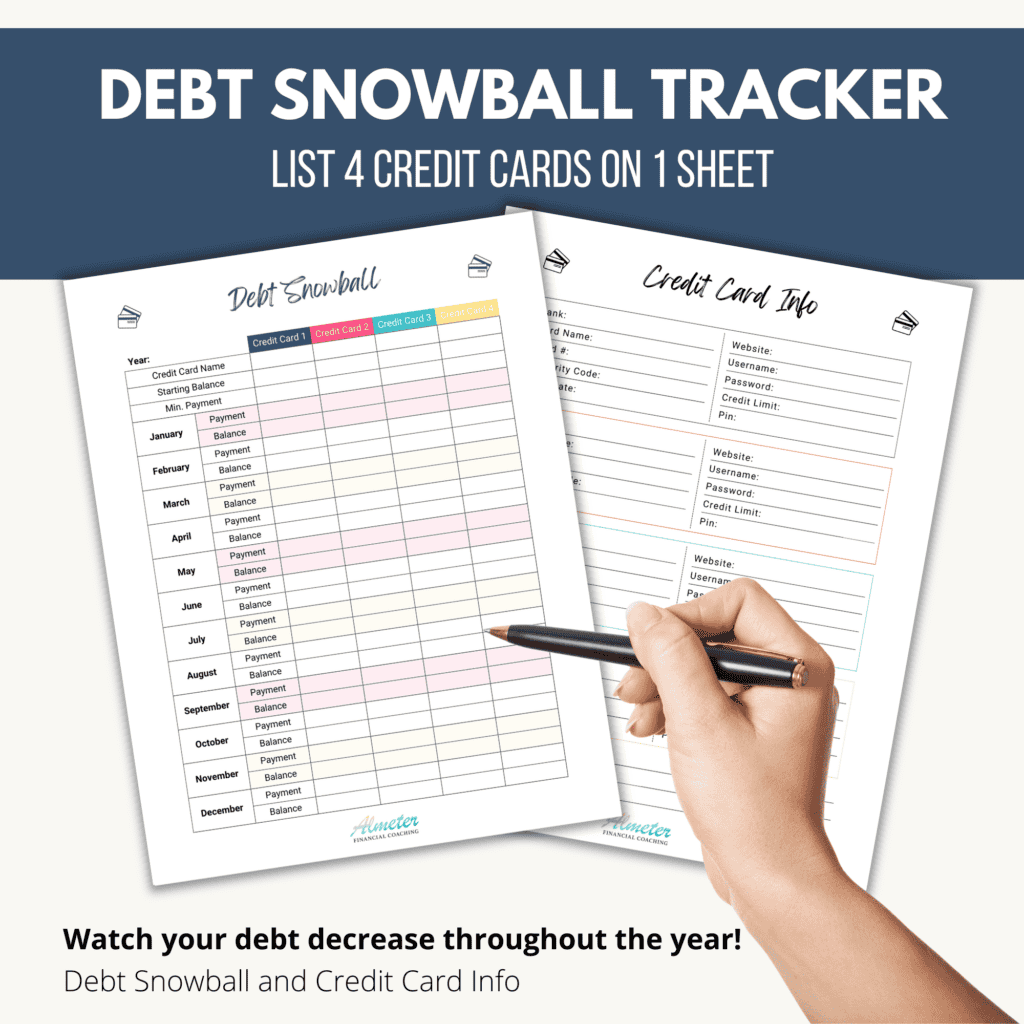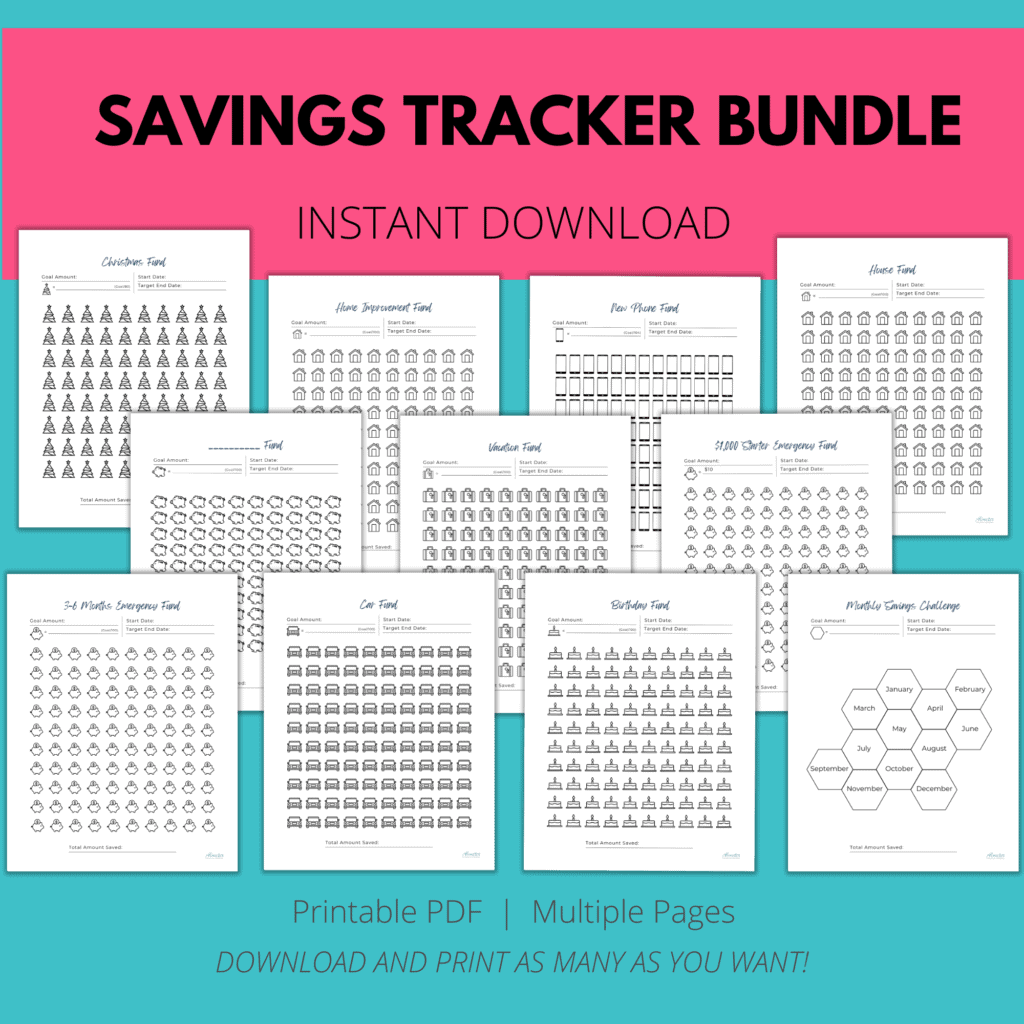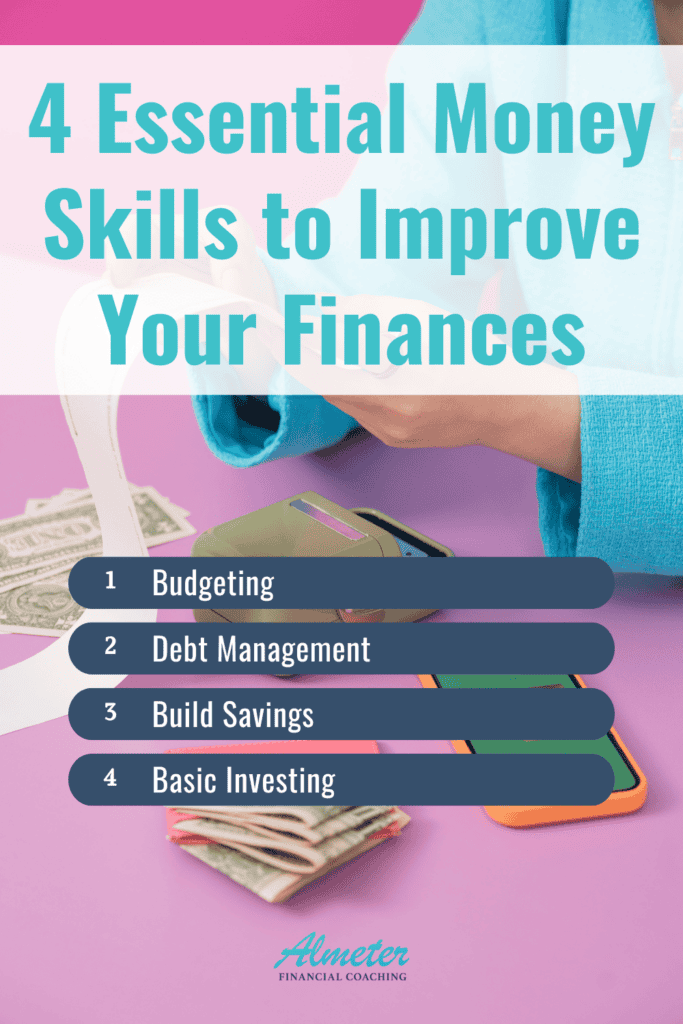This post may contain affiliate links. As an Amazon Associate I may earn from qualifying purchases at no additional costs to you. Please see the Policies pages for more info.
Basic Money Skills to Expand Your Financial Literacy
April is Financial Literacy Month, making it the perfect time to sharpen your basic money skills and take control of your financial future.
Whether you’re just starting out or looking to improve your financial habits, mastering key money skills can help you budget wisely, save consistently, and avoid common financial pitfalls.
In this post, we’ll cover four essential money skills everyone should know to build a strong financial foundation.
What is Financial Literacy?
There is not an exact definition of financial literacy. Investopedia defines financial literacy as “the ability to understand and effectively use various financial skills, including personal financial management, budgeting and investing.”
Unfortunately, financial literacy is a life skill that is not generally taught in schools and if your parents struggled with money then they would have a hard time teaching you money skills as well.
When young adults are thrown into the “real world” they quickly have to learn how to handle their money, sometimes by trial and error.
Why is Financial Literacy Important?
Money is everywhere and we all have to use it every day. Expanding your money skills is important to financial literacy because it will help you make smart and confident financial decisions.
Those smart money decisions are important for what you are doing now and also planning for the future.
4 Basic Money Skills
There are 4 basic money skills that everyone should know to have a foundational understanding of personal finance. It doesn’t matter what your income bracket is or how old you are, knowing these skills are key to managing your money well.
The 4 essential money skills are budgeting, debt management, building savings and understanding basic investing.

Money Skill #1 — Budgeting That Works for You
“Budgeting feels restrictive.” That’s a common misunderstanding when it comes to following a budget.
Budgeting is not about restriction. It’s about making a plan for your money each month so that you are more aware and more in control of your spending.
It is the foundation of all the other money skills because if you don’t know how much money you have coming in and going out, building savings and paying off debt is more difficult to do.
A monthly zero-based budget gives you a clear picture of your income and expenses.
A zero-based budget simply means that every dollar of your monthly income will have an assignment or expense listed for it.
Income – Expenses = 0
First, list all your expected income for the month. Then make a list of all your expenses. You will need to make adjustments until income less expenses equals zero. This gives your money a plan for the month.
Put It Into Practice – Make your budget for this month. If you’re a beginner at budgeting read Make a Budget: 5 Simple Steps to Get Started.

Money Skill #2 — Debt Management
Growing amounts of debt can be very stressful. Debt also steals from your future because you are paying for things in the past instead of saving for things in the future.
Having a debt payoff plan can help you relieve that stress and put your money back in your pocket, instead of the bank’s.
Tackle your consumer debt before you tackle the mortgage. Consumer debt includes credit cards, student loans, auto loans, personal loans, etc.
There are 2 common debt payoff strategies: debt snowball and debt avalanche.
Debt Snowball vs. Debt Avalanche
You have probably heard of the debt avalanche method before even if you didn’t know its name. This is where you list all your debts from highest to smallest interest rate. You pay minimum payments on all debts and make additional payments on the loan with the highest interest rate until it’s paid off. Then onto the next highest interest rate debt.
The idea of the debt avalanche is to save money by paying off loans with the highest interest rate.
The debt snowball method is where you list all your loans from smallest to largest balance. You make minimum payments on all loans each month and make extra payments on the smallest loan balance until it’s paid off. Then onto the next smallest loan.
The debt snowball method is great for quick wins because paying off that smaller balance first gives you momentum.
You can compare both plans by using a debt payoff calculator.
When I had over several student loans and an auto loan I was finally able to make progress and pay them off early using the debt snowball. I didn’t feel like I was making any progress with the debt avalanche.
Put It Into Practice – List all your debts except the mortgage and make a plan to pay them off one by one with either the debt snowball or debt avalanche method.

Money Skill #3 — Building Savings
Whether you consider yourself a natural saver or not, building a savings is an essential money skill everyone must learn.
Savings is about planning for the future. It helps you stay out of debt and makes larger purchases or unplanned expenses less stressful.
There are 2 categories of savings funds you should have; emergency fund and sinking funds.
Emergency Fund
An emergency fund is your financial safety net to life’s circumstances. No matter what your income level is, things happen. It could be an illness that keeps you out of work, a needed repair on the house or car, or a covering that transition period between jobs.
When things happen and you already have the money in the bank to cover it instead of putting it on a credit card so those things don’t become a financial stressor.
If you don’t have an emergency fund, your first goal should be to save $1,000 as quickly as you can. This is our cushion for smaller unplanned expenses.
You ultimately should have 3 to 6 months worth of household expenses (not income) in your emergency savings.
To calculate your monthly expenses for your emergency fund, add up essentials like mortgage/rent, utilities, gasoline, food, and personal care items. Then multiply it by the amount of months you would like to save up for.
Sinking Funds
Sinking funds are savings for specific items that you know will come up in the future. They break down your bigger savings goals into manageable monthly dollar amounts so that you are saving a little each month for that larger investment.
They can be related to short-term or long term goals. Each of them will have a dollar amount goal and the date you would like it by.
To calculate how much you have to put towards your sinking fund each month, take the total goal amount and divide it by how many months you have until the end date.
For example, say you pay your car insurance premium once a year and it’s $1,200. Instead of scrambling for $1,200 when the bill comes you save $100 each month in a savings account. ($1,200/12 months = $100).
You can have several categories of sinking funds that will fit into your monthly budget and they can change throughout the year based on your needs.
Examples of Sinking Funds:
- Insurance premiums that are not billed monthly.
- New car
- House projects/furniture
- Birthday gifts
- Christmas
- Kids sports/camps
- Vacations
- Down payment on a house
- New electronics (phone, computer, etc,)
- New clothes and shoes
Put It Into Practice – Determine your emergency fund and sinking fund goals.

Money Skill #5 — Basic Investing
Good news, you don’t have to be an expert at investing to reap the benefits. There are 2 main things to keep in mind when it comes to investing; time is your friend and it’s ok to seek help.
Time is Your Friend When Building Wealth
Just like building savings for everyday things, investing is making a plan for your future now.
“Retirement is not an age, it’s a financial number,” says Chris Hogan
If retirement was a magical number of turning 65 then we wouldn’t see people working in their 70’s to be able to pay the bills. And we wouldn’t see people retiring “early” at 55 and spending their day doing whatever they want.
Planning for retirement doesn’t have to be overly complicated. The earlier you start the better.
Time is your friend with investing because compound interest is also your friend. The earlier you start investing, even if it’s just $100 a month, the bigger retirement fund you will have later.
Your employer’s 401(k) or 403(b) plan is the easiest place to start if it’s available to you.
These plans are a pretax option that comes out of your paycheck before you have been taxed. This is one of the benefits of a 401(k) or 403(b).
To show you that time is your friend, let’s compare some numbers using an investment calculator. For comparison sake we are using the average rate of return of 10% with a retirement goal at age 64.
If you started investing $100 a month in your company’s retirement plan at the age of 25, with a 10% return you will have $632,405 by the age of 65.
If you started investing $100 a month at the age of 40, with a 10% return you will have $132,682.
In this example, starting 15 years earlier is $499,723 more in your retirement! That is the magic of compound interest!
Seek Help with Investing
To expand your knowledge of basic investing principles I highly suggest reading Chris Hogan’s book, Retired Inspired. It’s an easy read and he will help you redefine retirement, understand the basics, and guide you on working with a financial advisor.
When you are ready to take your investing beyond your company plan, meet with a financial advisor. A financial advisor understands the market and helps you create an investment plan.
Put It Into Practice – Read Retired Inspired. It explains your options with investing in terms everyone can understand. (You don’t need a finance degree). It will also guide you in finding the right financial advisor.
Conclusion
Financial literacy isn’t just about knowing the basics—it’s about putting them into action. By strengthening these four essential money skills, you’ll be better equipped to manage your finances with confidence.
Which money skill are you ready to tackle first? My free Financial Wellness Checklist will help you stay organized throughout the year as you expand your financial knowledge and improve your personal finance skills. Download it today!
Related Articles
7 Best Books on Budgeting and Saving
Dave Ramsey Baby Steps to Financial Peace
The Best Budgeting App for Managing Your Money


